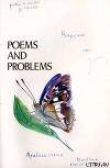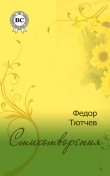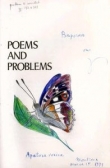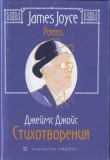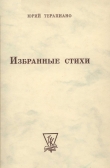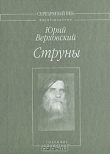A moongate in my wall: собрание стихотворений
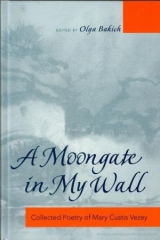
Текст книги "A moongate in my wall: собрание стихотворений"
Автор книги: Мария Визи
Жанр:
Поэзия
сообщить о нарушении
Текущая страница: 18 (всего у книги 19 страниц)
From the collection Закат, Paris, 1931.
[Закрыть]
We dream our dreams, but do not know that they
are God’s own warnings, and believe them not.
A last night’s dream, like smoke, will blow away,
today will come – and it will be forgot.
So with this earthly life – when death is nigh,
and on the death-bed frozen falls our hand,
closing the lid of our wondering eye,
we never will recall or understand!
16 Sept. 1930
Poem not found in a collection of this poet, presumably translated from a publication in a Russian emigre newspaper.
[Закрыть]
I know not how or why, at whose behest,
by what strange powers of the earth or sky,
you share with me my crust of bread, and lie
close to the heart that heats within my breast.
In days that are inspired, as on the day
of death – you are inseparably near.
All else will pass, all else will disappear…
I he constant shining of your eyes will stay.
16 Sept. 1930
From the collection Закат, Paris, 1931.
[Закрыть]
As slaves are driven from behind
with w hip and shouts that don't abate,
so I am goaded by my blind,
my cruel and relentless fate.
In such a servitude and pain
what boundless strengths one must possess
in order not to go insane
or die from hunger and distress!
But as the day grows ever dimmer
it s pierced – so often! – from the skies
by slender wings that lightly shimmer
and luminous transparent eyes.
I die so slowly, crawling, groping…
Yet as I reach the gate of heaven
I know that he will pull it open
and with his wing will help me in.
[1930]
Second part of the poem from the collection Закат, Paris, 1931
[Закрыть]
Don't go away, for I am lost,
stay here, for I am cold;
upon my chest my hands are crossed
that I may not unfold.
I cannot lift my eyes to see,
it's cold, and dark as well.
This cannot be, this cannot be
the bottom of the well…
[1930]
From the collection Закат, Paris, 1931.
[Закрыть]
Never felt I more to be pitied,
ridiculous, clumsy, weak;
I dreamed I was turning blind,
the sky was a blackened streak.
Oh, weight of unseeing sadness,
remembrance of earthly day!
Invisible voices, crying,
ran past me upon their way.
Oh, death without putrefaction,
insatiable worm of night.
I summoned God to redeem me,
but it was you who replied.
The lower your voice, the softer,
the more the answer grew clear:
«My dear, I hear you, I hear you,
there is no salvation, dear!»
[1930]
From the collection Закат, Paris, 1931.
[Закрыть]
It all will be as I have always wished:
over my feet the cover will be white
and white will be the ribbon of the wreath
around my forehead, grown cold and dark.
Keeping my earthly, my familiar look,
three long, three not-to-be-forgotten days
alone upon the table I will lie.
Pompous and solemn, the memorial mass
will be performed above me by the priest
and silently around me there will stand
my family, my enemies, my friends,
and those with whom I lived and whom I'd met;
and the transparent pallor of her face
will lend an added beauty to my wife.
It all will be as I have always wished.
And only you will never have a chance,
in your great longing and your last despair,
to touch my hand, my all but living hand,
to touch already my unseeing eyes.
And even into the wide open church
you will not dare to enter with the rest.
But, waiting for me somewhere on the way,
pressing your hand over your pain-stilled mouth,
you will observe my coffin floating past
silently, in the mist, without a trace…
And at that moment the dead heart in me
will suddenly, in mortal pity, shake,
and you will clearly hear the distant beat
– the beat, so long familiar, of my heart.
But people will not hear a sound.
[1930]
From the collection Закат, Paris, 1931.
[Закрыть]
At last the poem is completed.
The soul is void, the soul is light.
The hand that holds the pen is shaking
as from a giddiness of flight.
The world of phantom, barely seen,
swaying, recedes into the gloom;
out of the darkness Earth arises
steadfast and ponderous as doom.
As only on a sheet of paper
a mark, unsure and indistinct,
reflects the light which fell from heaven
in smallest drops of drying ink.
And now the heart beats faster, weary,
as if beyond some starry goal
running across the plains of heaven
the body too had chased the soul.
[1960s]
From the collection Наедине, Paris, 1938.
[Закрыть]
Burn in the foggy whiteness, burn,
burn in the fog of icy skies,
lighting the murky twilight stillness
with your bright body as it flies.
And soaring from the crowded heaven,
enter my crowding prison walls
through the slit window, like a bird,
to visit me when evening falls.
Soaring above decay and coldness,
incomprehensible, though near,
glide, circling from the vaulted ceiling
down to the dusty corners here,
that – even for the briefest moment!
and though I burn my fingers through —
I am allowed, in sweetest torment,
to touch the body that is you.
[1960s]
Poem not found in a collection of this poet, presumably translated from a publication in a Russian emigre newspaper.
[Закрыть]
Enormous world, embraced by sleep and dusk,
in which we live so close we gasp for breath
not guessing the beginning or the end,
dreaming of happiness which conquers death.
This indestructible, poor mortal land!
But close your eyes: another lies beyond —
A world in which you are a midnight star
immobile in its speechlessness and bright,
– a world in which I am a limpid pool
whose face reflects your ever-shining light.
Above this world, that other will appear —
that's quite transparent, and quite simply clear.
[1960s]
From the collection Закат, Paris, 1931.
[Закрыть]
A graceful swan that's slowly gliding
upon the mirror of the lake,
a falcon in the clouds abiding —
my dream-invented world is riding
in phantom imagery's wake.
Between its wings, unfurled and gleaming,
I slowly drift, not knowing where,
sweetly and languorously dreaming,
regretting nothing, nor redeeming,
melting in this transparent air.
And this prophetic voice of mine,
voice of my soul in dream's embrace,
above abysmal darkness flying,
is echoed hollowly, and, dying,
it disappears without a trace.
[1960s]
Poem not found in a collection of this poet, presumably translated from a publication in a Russian emigre newspaper.
[Закрыть]
They will live very crowded – this Earth like a jail they will crowd,
Cod and hell and eternity even they all will deny,
and their houses of steel and concrete will reach up to the cloud,
and a huge zeppelin to the farthermost planet will fly.
And when over this world that is whirling the trumpet does sound,
and the firmament over this Earth opens wide like a gate,
and the lights all go out, and the graves open up in the ground,
none will then understand what is meant or believe anymore.
[1960s]
From the collection Наедине, Paris, 1938.
[Закрыть]
At midnight, when the pallid moon,
shivering as from cold and pain,
within its bluish aureole
soars upward past your windowpane,
when burnt by the celestial cold
silently floating in the dark
its rays that shimmer in the night
are barely heard above the park,
then, through the stillness and the dream,
in all your grief of long ago,
you will approach your windowsill
and push the panes apart and go
out of the darkness gliding up
a path by human eyes unseen
on which your foot will never slip
nor will you falter or careen.
And in the ringing solitude
with hand outstretched and sleeping eyes
heavy and cumbersome and slow
above the darkness you will rise
until from out the icy space,
the earthly blackness void and still,
some reveller's nocturnal voice
suddenly rises sharp and shrill.
Then, jolted, will the heavens rock
and swim, and lights go out that shone,
and dead onto the stones below
the moon will tumble like a stone.
[1960s]
From the collection Стихотворения, Milan, 1977.
[Закрыть]
Akhmatova, Ivanov, Mandelshtam —
forgotten notebook I have rescued here —
«Hyperboreus» – home for transient verse
of youthful poets in that happy year.
I found it at the bottom of a trunk
among my dusty archives lost retreat.
And forty year – is that not ancient yet?
To have survived so long – not yet a feat?
«October. Notebook Light. Nineteen Thirteen».
Year of the sunset, last bright, carefree year.
For all that followed was not life at all,
but time of reckoning, reprisal, fear.
This notebook – witness of a golden age,
these pages – that escaped the lethal stream!
I open it, I read – my eyes are wet, —
how young the poems, young the poets seem!
And I – how old! How wasted all these years!
How dark ahead what – emptiness behind!
What awesome thought – that not a trace of me
will anyone, in any notebook find!
1 Nov. 1966
From the collection Прозрачная тьма. Стихи разных лет, Livorno, 1969
[Закрыть]
To Mary Vezey
The street lamps shed their meager light,
mist wove its wisps about the town,
a chilly twilight shuttered tight
all windows, drawing curtains down.
Then, growing white, not vapor-soft
but heavy, like a lowered load,
dusk let a fragile hoarfrost waft
onto the sidewalks and the road.
November midnight: winter's eve,
a helpless longing, taut distress
of autumn strings in mute reprieve,
leave-taking, but without redress…
A sketch from nature? – No: the time
was filled with flowers, springlike-bright,
when suddenly the poet's mind
envisioned this November night.
About him warm th and sunlight shone,
young foliage gleamed, birds flitted, gay,
everything bloomed, – his soul alone
had left this blossoming of May.
He roamed along deserted roads,
where street lamps shed their meager light,
where mist in pungent smoke-rings rose,
where hoarfrost tinged sidewalks white.
5 Dec. 1967
From the antology Содружество, Washington, 1966.
[Закрыть]
We parted at an early date, —
youth, – in the blackest year of war,
though we had been fast friends before,
still, friendship cannot conquer fate.
Our parting came at night, when skies
were dark above the steppe. Your way
was down the trail to yesterday,
and never once you raised your eyes.
Night quenched the heat, and scattered far
the glare of sunset; and the grass,
its strings by twilight winds harassed,
moaned in the steppe like a guitar.
And from afar I could discern
a voice that sang for me alone
that all my happy days were gone,
that you were never to return.
1967
Poem not found in a collection of this poet, presumably translated from a publication in a Russian emigre newspaper.
[Закрыть]
No matter where I look, I find
dimensions perfect everywhere:
a star is wondrously designed,
crystals are regular and fair.
Foolish, the beating heart, alone,
is not concerned with star or beam;
it will not cease to long and moan,
it's built on quite a different scheme.
[1960s]
Poem not found in a collection of this poet, presumably translated from a publication in a Russian emigre newspaper.
[Закрыть]
Climb atop of the loftiest mountain,
gaze about from the peak where you stand
toward the sheen of the sunset in autumn,
and the sweep of the far land.
There is soundless music around you,
contemplation and stillness are deep.
It is evening. Mountain ranges
darken, waiting for quiet and sleep.
[1960s]
Black, like the pupil of an eye, like the pupil, sucking
light – I love you, vigilant night.
Give me voice to sing of you, oh original mother
of songs, holding the reins of four winds in your palm.
Calling you, glorifying you, I am only
a sea-shell, where the sound of the ocean has not yet been stilled.
Night! I've already looked long enough into the pupils
of man! Now reduce me to ashes, oh black sun, – night!
[1960s]
I know I will die at dawn, or at sunset – which of the two,
at which of the two – this cannot be foreordained!
Oh, if it only could be that my torch would be dimmed
both at sunset and sunrise, together, at once!
Dancing I walked over Earth! – the sky's own daughter!
Full of roses, my apron! Never a broken twig!
I will die at sunset or dawn! God won't send
the night hawk for my soul – the soul of a swan!
Moving the unkissed crucifix gently aside with my hand,
I will rush toward the generous sky for the ultimate greeting.
A slit of the dawn – and a slit of my smile in reply…
… In the hiccough of death, a poet still, – I!
[1960s]
On your dirk you etched «Marina»
when rising for the strife.
I was the first and only one
in all your splendid life.
I see the army boxcar hell,
that night, your radiant face…
Your curl I scattered to the winds,
your patch I laid in a secret place…
[1960s]
Не who survived will die, who died – will rise,
and when recalling olden days, a son
will ask «Where were you?» – like a roll of thunder,
so will answer thunder, «On the Don».
«What did you do?» – «We merely suffered tortures,
then we grew weary and lay down to sleep».
And pensively the sons, opposite «Duty»
will enter «Don» into the book they keep.
[1960s]
Above the meadows rings a requiem mass.
The secret book of Russia's Genesis
where all Earth's fates are hidden has been read
right to its end and has been tightly closed.
And round and round the steppe winds rove and scour
«Russia! Oh martyr! Rest in peace!»
[1960s]
If a soul is born with wings —
what does it care about earthly things!
About Genghis-khan and about his Horde!
I've but two enemies in this world,
twins who have ever together stood:
the hungry ones' hunger, the fed ones' food.
[1960s]
I wash my laundry in the brook,
I grow two flowers in my nook.
I cross my heart when church bells call,
I fast when there's no food at all.
As soft as silk – my soul, my hair.
My reputation must be fair.
To do my duty is my belief.
But oh, I love you – wolf and thief!
[1960s]
You gave us courage
a hundredfold —
let the worlds turn —
we will keep our hold;
and ribs so strong
they'll stand all pain
and remember the Kingdom
even when slain;
You lifted Your likeness
to the sky
since Your faith in Your likeness
wouldn't die.
They give us breath
and give us sweat
enough to bear
Your bounty yet!
[1960s]
From the collection Тяжелая лира, Berlin, 1923. Variant in the thirty-seventh line in the manuscript: «but doesn't want to keep too from hearing».
[Закрыть]
All night a snow-storm raged, but day broke calm and clear.
A Sunday laziness pervades my body still,
the Sunday service in the nearby church
is not yet over. As I step outside
into my yard, how small things are: the house,
the smoke that curls above the roof! The rose —
– and-silver of the frosty air – it lifts
its pillars over houses towards the sky's
high cupola, like wings of giant angels.
Sergei Ivanych, my fat neighbour, too,
all of a sudden seems so very small.
In high felt boots and lumber-jacket. Firewood
is scattered all around him in the snow.
As with both hands, and obviously straining,
he lifts his heavy ax above his head,
and yet the striking of his hits
is not too loud: the sky, the snow, the cold
absorbs the sound … «A happy Sunday, neighbour».
Says, «Ah, greetings». So I too set out
my firewood in my yard. He hits, I hit! But soon
I tire of chopping and 1 straighten up
and say to him: «Hold on a minute, now,
– I hear some music?» Sergei Ivanych
stops working, lifts his head a little way
and listens, though he doesn't hear a thing.
«You just imagined it», he tells me. «Really —
just listen hard. To me it sounds quite clear!»
Again he listens. «Could it be perhaps
a military funeral? Yet truly
I still hear nothing». But I don't give up:
«Good gracious, now it's perfectly distinct.
The music seems to come from up above.
Violoncello… and perhaps a h arp …
How beautifully played! Please stop that noise».
And once again my poor Sergei Ivanych
stops splitting wood. He doesn't hear a thing
but doesn't want to interfere with me
and doesn't wish to show me his annoyance.
Amusing: stands there in his yard, afraid
to interrupt the silent symphony.
I finally take a pity and declare:
«It's over». And again we both pick up
our axes. Bang! And bang again! The sky
is still as high above, and as before
feathery angels shine and glimmer in it.
7 Sept. 1967
Chinese into Russian (from English translations)Comment by Mary Vezey: «From the Sung Collection.»
[Закрыть]
С высокой верхушки горы звезда
скатилась на запад – далеко, туда.
Внизу, где блеснувшая речка видна,
восточная выплыла тихо луна.
Растрепан, по ветру откинув полу,
я еду в прохладную добрую мглу.
Ласкающий ветер несет аромат,
и ярко деревья росою блестят.
Роняя виденья с ветвей при луне,
вздохнут они лютне, зачем ты во сне?
Беззвучно на лютню рука упадет.
«Ведь я твоя лютня» – мне сердце шепнет.
29 марта [1929 г.]
Comment by Mary Vezey: «From the Fukiu mountain district of So-Chau, Kiangsu Province. Many centuries old.»
[Закрыть]
Мать жалости, услышь! Молюсь,
чтоб больше в вечном возрожденье
не рвалось сердце – ни в селеньи
земном, ни за безветреной рекой,
где праведных покой;
пусть, не живя нигде, я дальше все несусь.
Но если, но закону Кармы, я
должна вернуться в прах для бытия,
дай каплю мне твоей росы из ивняка,
и в лотосе, на дне цветка,
мне сердце сбереги во сне.
1 ноября [1929 г.]
Ты знаешь – вдалеке,
когда вино зардеет на реке,
за сотни верст, тебя я вспомню, друг,
в последнем уголке земли, – и вдруг,
ради тебя, вся – золото, весна
в дверь сердца моего возвращена.
1 ноября [1929 г.]
1
Плывущей толпой
рожденные луной
бросают тучки тень
на белую ступень;
и лунные пути слились
в одну серебряную высь.
Но верно кто прочтет
тайну, что ночь несет?
4 ноября 1929 г.
Одетые сказочно, девушки в алом ушли,
но в сердце моем их свирели оставили след:
их нежный напев улетел в облака от земли.
Плясавших мечтательно тоненьких девушек нет.
29 марта [1929 г.]
Как шопот, ветер в соснах шевелится,
река, как будто пояс, вьется там.
Мои шаги вдоль древней черепицы
пугают серых крыс по сторонам.
Похожие на дым лиловый, встали,
я вижу, духи, и средь тишины
на том пути забытом зазвучали
и вздохи и слова, едва слышны.
И много тысяч странных голосов
из пустоты в один напев слились.
И листья, пестротой своих ковров,
для привиденья осени сплелись.
Так легион умерших проходил
столетьям улетающим во след.
Я этот марш бы песней заглушил,
но кроме слез во мне и песен нет.
29 марта [1929 г.]
Attributed to Wang Anshi in manuscript. Variant in the fifth line in the manuscript: «Так, к востоку от горной страны».
[Закрыть]
Ветер с запада воду рябит,
красный цвет опадает с ветвей,
расставанье с тобой возвестит
серенада на лютне моей.
Так, на востоке от гористой страны,
будут песни разлуки слышны.
29 марта [1929 г.]
Заря за зарею – последнюю ближе несет.
О, так бесполезен весны этой робкий приход!
Достань же вина, и сегодня – бокал наливай.
Пусть розы и ночь упадают,
А ты – забывай.
29 марта [1929 г.]
Chinese into English (from Russian translations)
The Great Mercy, Great Pity, Goddess of the Southern Seas
Kuan Yin, о compassionate light that enlightens the world,
Wisdom that pierces all shadows, subduing all evils!
Kuan Yin, who protects us in danger, in suffering, pain, and in death —
O, Thou of the purest regard that watches all beings below,
Hears all the sounds of the world and extinguishes hatreds and discords,
Kuan Yin, may I think of thee always, so saintly, so pure and so kind,
Be my support and my strength, and help me fulfill all my duties,
See – I am kneeling before thee, invoking thee, Ocean of Pity!
[1920s]
Korean into English (from Russian translations)[313]313The translations in this section all come from poems originally printed in Корейские шестистишия, Alma-Ata, 1956. Poems 683–688 come from the cycle «Девять косанских песен», 691–695 are from the cycle «Песни о пяти друзьях», 696–699 from the cycle «Новые песни гор», ami poem 700 from the cycle «Весенние песни рыбаков». The explanations of Korean place names and words are those of the Russian translators, A. Zhovtis and P. Pak Ir.
[Закрыть]
Variant in the second line in the manuscript: «Has it parted from someone?»
[Закрыть]
Behind the door the candle is rapidly melting,
From whom has it parted?
Why must it weep wax tears
If the heart inside it is burning?
This candle reminds me
Of that which has happened to me.
[1960s]
Where the rivulet runs through the green of the cove,
I roam, like a horse without saddle or rein.
I look to the north and think of my love
With longing and pain.
The sun has departed and shadows descend.
My sorrow alone does not end.
[1960s]
The north wind roams the land,
Sweeping the snow in drifts;
Bleakly the peach trees stand,
its frozen boughs each lifts.
But is useless for the wind to blow:
Hear now Spring's heartbeat underneath the snow!
[1960s]
White seagull, turn away
from the black ravens' fray:
let them unsnarl
their ugly quarrel.
You, washed with azure spray,
don't soil your white apparel.
[1960s]

